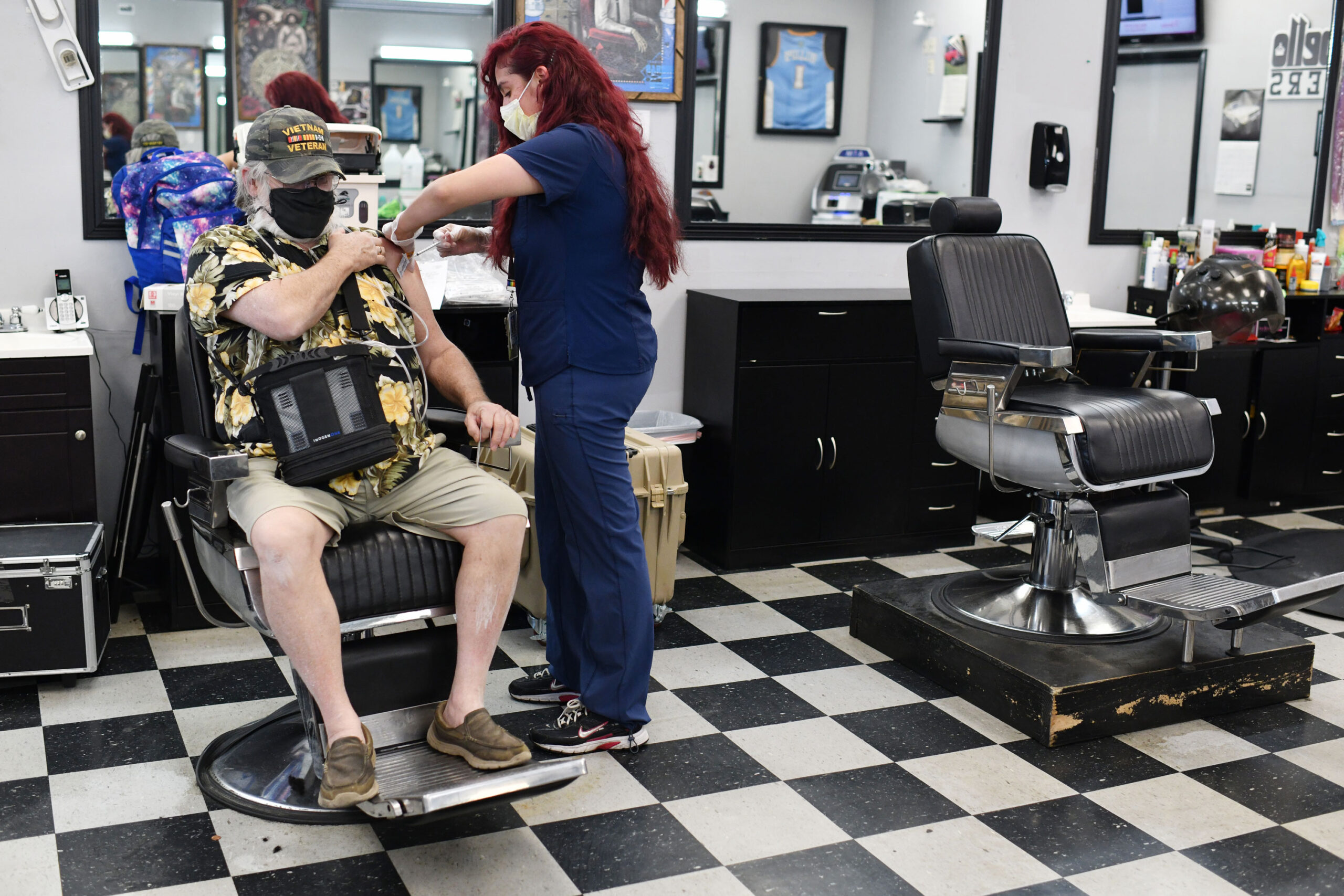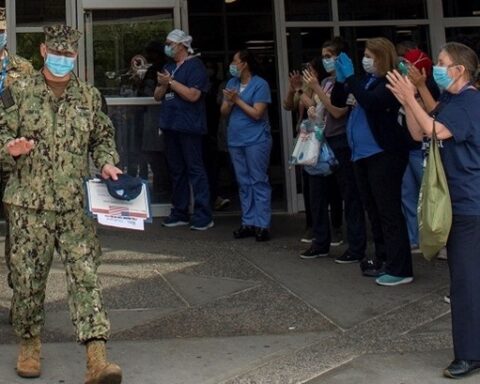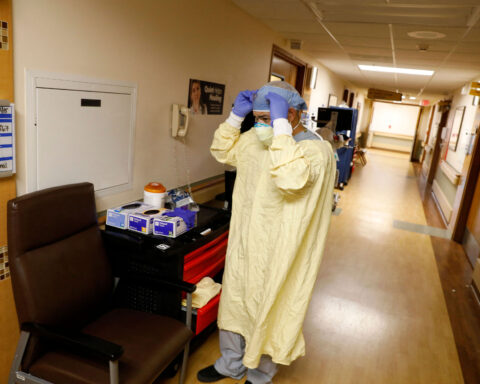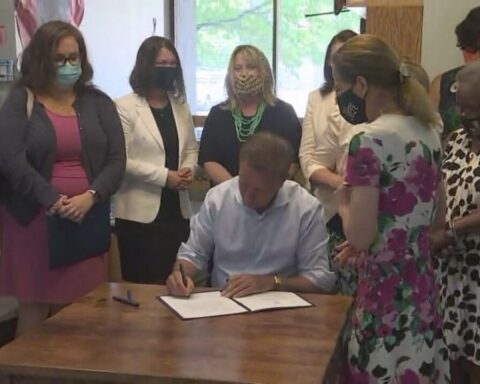New data shows 26 states have fully vaccinated more than half their residents, and those with the highest vaccination rates have among the lowest Covid-19 cases.
Vermont, Connecticut and Massachusetts have fully vaccinated at least two-thirds of their population, according to data from the US Centers for Disease Control and Prevention.
Those three states also have among the lowest new Covid-19 cases per capita over the past week, CDC data shows.
But elsewhere, hospitals are filling up with unvaccinated Covid-19 patients.
“We actually have the lowest ICU available rate that we’ve had since the start of this crisis, in part due to the unvaccinated with Covid and just other types of trauma that goes up seasonally this time of year,” Gov. Jared Polis, D-Colo., said Friday.
“Some hospitals are reaching very close to their capacity limits. And that wouldn’t be happening if people were vaccinated.”
In Florida, Covid-19 patients occupy 27 of the 28 ICU beds at St. Anthony’s Hospital in St. Petersburg, hospital president Scott Smith said.
He said about 85% of the hospital’s Covid-19 patients are unvaccinated.
Some of those hospitalized ask for a Covid-19 vaccine too late, said pulmonologist Dr. Hudman Hoo, medical director of St. Anthony’s ICU ward.
“We have had patients that come and request, ‘Can I get a vaccine now?’ But they don’t understand that it’s something that’s meant to be preventative,” Hoo said.
More than 43% of Florida’s ICU beds were occupied by Covid-19 patients, according to data Saturday from the US Department of Health and Human Services. Nationwide, about 31% of ICU beds were taken up by Covid-19 patients.
New study shows vaccines’ effectiveness against hospitalization
Despite the dominance of the more contagious Delta variant, vaccines are still highly effective against Covid-19 hospitalization, a new CDC study found.
Among all ages, the Moderna vaccine was 95% effective against hospitalization, while the Pfizer/BioNTech vaccine had an 80% effectiveness and the Johnson & Johnson vaccine had a 60% effectiveness, the study found.
But among those 75 and older, the study found vaccine effectiveness against hospitalization was 76%, compared to 89% for adults under 75.
“Fully vaccinated” still means at least two weeks have passed since the second dose of the Pfizer/BioNTech or Moderna vaccines or at least two weeks have passed since the single-dose Johnson & Johnson vaccine.
But as federal health officials consider a booster dose for most Americans, the definition of fully vaccinated may change, CDC Director Dr. Rochelle Walensky said Friday.
“I anticipate over time that may be updated, but we will leave that to our advisers to give us some recommendations,” Walensky said.
Vaccine requirements will help the economy, surgeon general says
The new vaccine requirements recently announced by President Joe Biden have been met with praise and criticism.
Businesses that want employees to return to work and stay at work will benefit from vaccine requirements, US Surgeon General Dr. Vivek Murthy said.
“A lot of businesses are actually relieved that these are going into place,” Murthy told CNN on Sunday.
“We’ve heard a lot of feedback from the Business Roundtable and others that this will help us create safer workplaces.”
High vaccination rates would benefit employees, not just employers, Murthy said.
“If we ultimately want to not only get people back to work but keep them at work, if we want workers to know, ‘Hey, I’m coming back to the workplace and it’s going to be safe,’ these vaccinations will help people do that,” he said.
“And I believe that will not only improve public health, but it will give people some more peace of mind.”
It may take “many, many” more vaccine mandates to end the pandemic, Dr. Anthony Fauci, the director of the National Institutes of Allergy and Infectious Diseases, said Sunday. School and business mandates would make a difference, he said.
“I believe that’s going to turn this around, because I don’t think people are going to want to not go to work or not go to college or not go to university. They’re going to do it,” Fauci told CNN’s Jen Christensen in an interview at the NLGJA, the Association of LGBTQ Journalists, convention.
“You’d like to have them do it on a totally voluntary basis, but if that doesn’t work, you’ve got to go to the alternatives.”
The combination of the highly contagious Delta variant and vaccine holdouts has put the United States in a “very difficult period” of the Covid-19 pandemic, Fauci said.
“We have a really unfortunate situation that we have a pretty hard-core group of people that we’re trying to persuade them, or mandate them, if they’re not persuaded, to get vaccinated,” Fauci said. “We have the tools to end this and yet we’re not doing this.”
Testing helps avoid school quarantines, expert says
As schools struggle with Covid-19 outbreaks and quarantines, one former federal health official said effective testing can reduce outbreaks.
Putting students in “pods” in schools and routine asymptomatic testing can help reduce transmission in schools, former US Food and Drug Administration Commissioner Dr. Scott Gottlieb said.
“Rather than quarantine that whole classroom, you just test them in a serial fashion to make sure that you didn’t have an exposure that led to a downstream case and so you can actually use testing to prevent quarantines.” Gottlieb said during an Axios event Friday.
He said even though Covid-19 case rates may be declining in some older age groups, “it’s continuing to increase is in school-aged children.”







